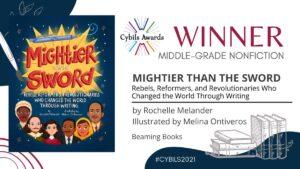Devote Time to Deep Work
February 22, 2022
Note From Rochelle
Dear Writers,
 I received some amazing news last week! My book, Mightier Than the Sword, won the 2021 Cybils Award for Middle Grade Nonfiction. I cannot tell you what a tremendous honor this is! I was delighted to be nominated, taking my place among a really stellar field of nominees. (Take a look at the list and go read all their books: http://www.cybils.com/2022/01/2021-finalists-elementary-and-middle-grade-nonfiction.html) And when I heard the news that MIGHTIER won, I was so thrilled—because it should help get the book into the hands of more children.
I received some amazing news last week! My book, Mightier Than the Sword, won the 2021 Cybils Award for Middle Grade Nonfiction. I cannot tell you what a tremendous honor this is! I was delighted to be nominated, taking my place among a really stellar field of nominees. (Take a look at the list and go read all their books: http://www.cybils.com/2022/01/2021-finalists-elementary-and-middle-grade-nonfiction.html) And when I heard the news that MIGHTIER won, I was so thrilled—because it should help get the book into the hands of more children.
If you have a chance, please take a moment and request that your local library order the book. If you have a few more moments, read the book—and post a review on Amazon.
And now on to today’s tip. This past week has been dizzying. Good news brings a swirl of joyful activity online. But it’s not just good news that distracts us. Worries, wonders, and just plain boredom can pull us from our projects. Today’s tip will help you to learn how to avoid distraction and focus!
Happy writing,
Rochelle, the Write Now! Coach
Devote Time to Deep Work
by Rochelle Melander
What’s getting in the way of your writing?
My clients often come to me because they’re facing down a deadline and can’t seem to get their work done. They’re overwhelmed by all of the tasks that come with being an author: maintaining a social media platform, marketing their work, and attending to email. They’re distracted, harried, and frustrated. And they need help – now!
According to cognitive psychologist Daniel Levitin, author of An Organized Mind, we’re overloaded with information. Because of technology, we’ve taken on many of the roles that used to be done by other professionals, such as making travel arrangements. And we live in a culture where people expect an immediate response to phone calls, texts, and emails. (Why the Modern World is Bad for Your Brain by Daniel J. Levitin)
To combat this additional influx of work, we try to multitask. We write a bit, check Facebook, write a bit more, check email, jot down a few sentences about a new project and … well, you get the picture. We call this multitasking but it’s really task switching or rapid toggling. Research shows that task switching—even if we just think about what’s on Facebook or in our email cue—can lower our IQ by as much as ten points. And rapidly switching from one task to another also burns up the nutrients we need to focus, leaving us “exhausted and disoriented.” (Why the Modern World is Bad for Your Brain)
So what’s the solution? Taking the following steps will help you write more and feel less overwhelmed.
Schedule time for DEEP WORK
Author Cal Newport coined the term “deep work” for any activity that requires our full attention. When you’re researching, writing, plotting, or revising—you are engaged in deep work. As a writer, you need to schedule time for deep work every week.
Focus on one task at a time
It’s tempting to multi-task, but it doesn’t work. Even media multi-tasking, watching television while reviewing email, means we’re less effective at each task.
Find a quiet place. Hide your phone. Turn off anything that might distract you. If you have difficulty doing this, you can purchase a tool to block out distractions while you write. Popular examples include FocusWriter, SelfControl, or Omniwriter.
Schedule the rest
It’s easier to focus when we know that we have time set aside to do the rest of the stuff, like checking email, returning calls, and posting on social media. It’s helpful if you can cluster similar tasks—setting aside an hour to do all of your social media or email.
Give yourself a break!
Taking regular 15-minute breaks can help you be more productive. But the key is to take the right kind of break. Specific kinds of breaks tend to boost energy or encourage breakthrough thinking. Walking in nature, taking short naps, and exercising all increase our energy and restore our ability to pay attention. And repetitive mindless activities like walking, folding laundry, washing dishes, and playing tennis can help us find that “aha” moment.
Get help
If you try these tools and still feel distracted, you might need more focused support. Writer’s block, procrastination, and even monkey mind can show up when you’re facing a manuscript problem (I don’t know how to organize this!) or doubting yourself (I’m not good enough to write this.). Talk to a colleague, hire a coach, or consult an editor.
Your turn
What’s your solution for combatting modern distractions and getting work done?
A version of this post first appeared on Career Authors.









